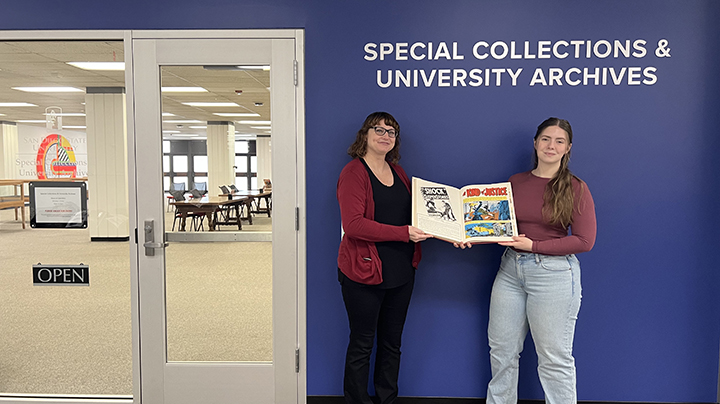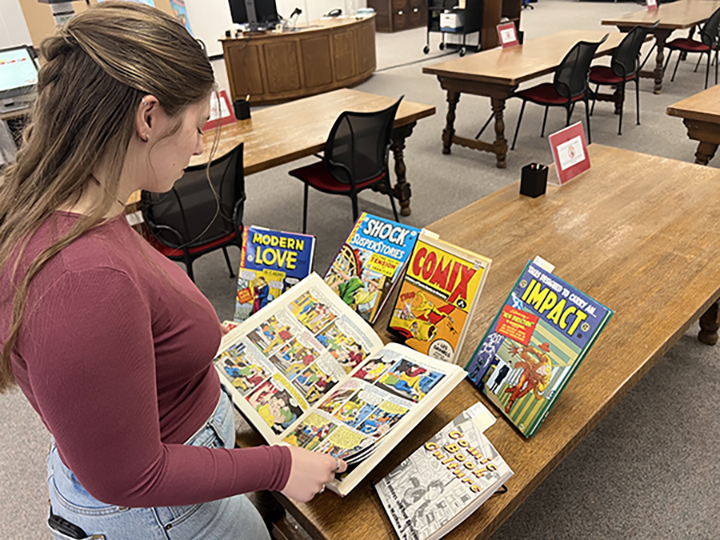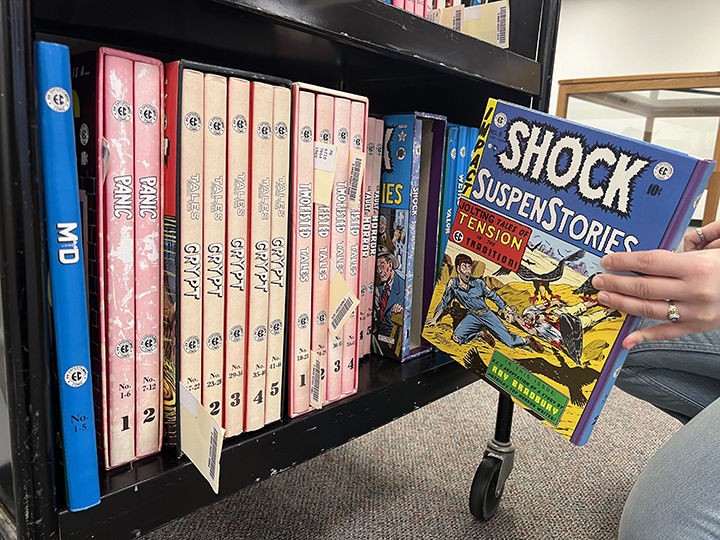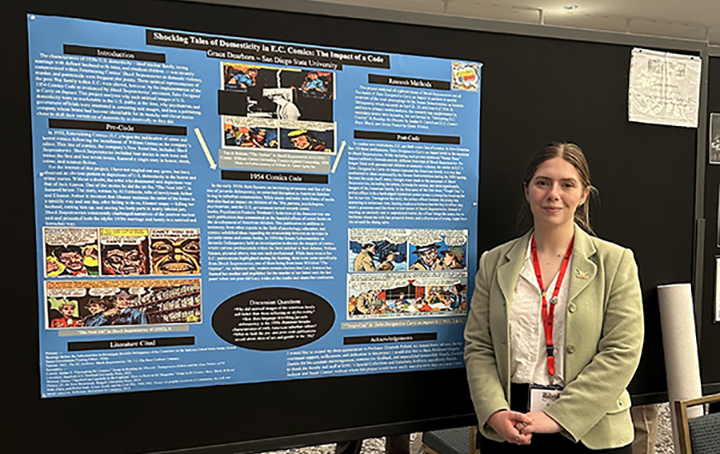Grace Dearborn: History Researcher and Comics Fan

San Diego State University History major and library student assistant Grace Dearborn (‘24) is very enthusiastic about her research project, “Shocking Tales of Domesticity in EC Comics: The Impact of a Code."
She originally had the idea while taking the class Cold War Comics from Professor Gregory Daddis. She was intrigued by the depiction of the American family in comics in the 1950s and wanted to spend more time with the topic.
Dearborn also remembered listening to the radio dramas of that period with her father. She especially loved “Suspense”, “Fibber McGee and Molly”, and “Yours Truly, Johnny Dollar.” She remembered that, “‘Fibber McGee and Molly’ follows the dynamic of a couple and has some very goofy storylines. ‘Suspense’ was thrilling and scary. The interests that developed from these two shows are extraordinarily prevalent with my current interests in representations of mid-20th century domesticity.”
Her interest in comics was enhanced by a campus job in the University Library Special Collections with Pamela Jackson, Popular Culture librarian and co-director of the Center for Comics Studies.

Thus was born the project, “Shocking Tales of Domesticity in EC Comics: The Impact of a Code.” Dearborn looked at a specific comics publisher, EC Comics, and how their depictions of the American family changed after the U.S. Senate Subcommittee on Juvenile Delinquency encouraged the Comics Magazine Association of America to institute the Comics Code of 1954, which detailed what comics should and should not portray to discourage juvenile delinquency. Professor Elizabeth Pollard, co-director of the Center for Comics Studies, agreed to serve as her advisor.
Dearborn was grateful that the SDSU Comic Arts Collection contained the volumes of EC Comics that she used in her research. These are not easily found and purchasing them would have been beyond her means. She is also very grateful for the guidance that Jackson was able to provide. In addition to finding the right comic volumes, Jackson also helped Dearborn find other original reference materials available in the library’s collections.

Jackson says, “Advances in our curriculum, coupled with a fantastic library collection of comics, have shown students that comics are an exciting medium worthy serious study. Comics often mirror society and engage visual literacy and critical thinking skills. But they're also fun, and that fun helps draw students in! Helping students like Dearborn connect their subject discipline to comics is one of the more rewarding parts of my job. For long-term research projects I'm able to continually add new comics for them to consider, answer deeper research questions during their discovery process, and mentor them about taking their research to the next level. Seeing the passion and joy students bring to their comics research is exciting!”
Dearborn hopes her project will help people understand the power of government censorship. She sees parallels between what happened to 1950s comics and today’s efforts to censor video games and other popular art forms to combat a perceived rise in violence. She wonders what is lost when brands are forced to change to suit government policy, regardless of what people want to buy, read, or use.
She says, “I also want to inspire other humanities students to conduct their own research projects. I think students want to do research, they just need help getting started.” She will graduate this semester and is currently applying to graduate school programs to continue her historical research and is even considering combining history and library science so she can someday work in a university library helping other students.
Dearborn’s research project drew the interest of the American Historical Society and she was invited to present a poster at their annual conference. She will also present her poster at the S3 (SDSU Student Symposium) on campus.

Daddis said, “Dearborn is a standout undergraduate student and excelled in my Cold War Comics course last year. She did primary source research in our library's special collections to examine how conceptions of post-World War II domesticity played out in popular comics. Given the shifting gender norms of the time — Rosie the Riveter returned home from the wartime defense industry to suburbia in much of the early Cold War pop culture — Dearborn wanted to explore how some comics like EC pushed back against the consensus of domesticity. She made SDSU proud by representing all of us at a premier academic conference.”
Pollard notes the usefulness of the comics collection for the kind of work Dearborn is doing. "It's great to know that each research lead Dearborn develops can be effectively tracked down, thanks to the materials on hand in SDSU's Comic Arts Collection and the support that SCUA provides. Sure, researchers like Dearborn can access comics, even old comics, online... but that's not the same as having the physical comic, complete with its original coloring, newsprint smell, and paratextual advertisements in your hands as a historical artifact."
“The arc of Dearborn’s research is a perfect illustration of the impact that library collections and library faculty can make on a student’s path toward discovering research opportunities and a passion that will help them to find a plan for life after graduation,” according to Library Dean Scott Walter. “Over the past decade, we have worked with students, faculty, and donors to build a world-class comics collection that fuels innovation to teaching, research, and community partnerships, and, with the growth of the academic program we have new opportunities to support student research, as well. The SDSU comics collection supports the work of 14 academic courses offered under the aegis of the College of Arts and Letters’ Center for Comic Studies, and an additional ten courses are currently under development. We look forward to being able to support many future projects like Dearborn’s with the continuing support of the Center and our donors.“

